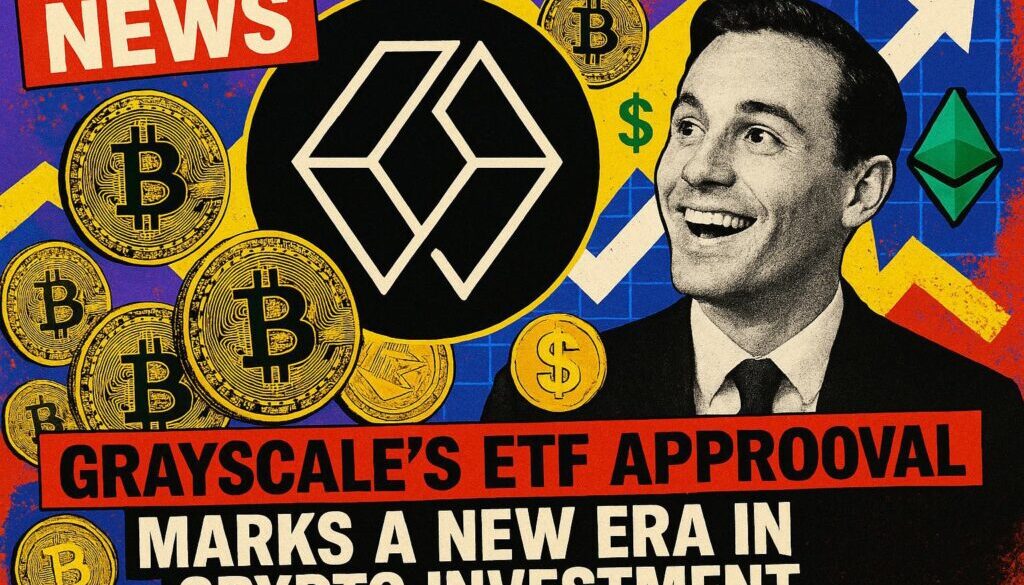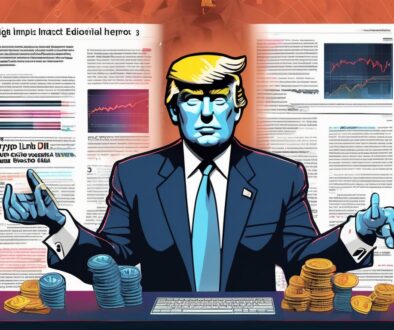Grayscale’s ETF Approval Marks a New Era in Crypto Investment

Grayscale’s Landmark ETF Approval: Ushering in a New Era for Crypto Investment
The landscape of cryptocurrency investment is undergoing a significant transformation, spearheaded by regulatory approvals that are paving the way for broader institutional and retail participation. A pivotal moment in this evolution is the recent approval by the US SEC for Grayscale to convert its Digital Large-Cap Fund into an exchange-traded fund (ETF). This decision not only validates Grayscale’s pioneering efforts in making digital assets accessible but also signals a maturing market where traditional investment vehicles are increasingly embracing the decentralized world.
For years, Grayscale has been at the forefront, offering investors a pathway to digital assets without the complexities of direct ownership. Their trusts provided unique opportunities, albeit with their own set of intricacies. Now, with the shift to an ETF structure, Grayscale is further streamlining access, promising greater transparency and efficiency for investors looking to diversify into the crypto space.
Grayscale’s Digital Large Cap Fund ETF: Composition and the Evolution of Arbitrage
Grayscale’s Digital Large Cap Fund ETF is strategically composed of the top five cryptocurrencies by market capitalization, offering a diversified exposure to the leading digital assets. As of its approval, the fund’s composition is weighted as follows:
- Bitcoin (BTC): Approximately 80.2%
- Ether (ETH): Around 11.3%
- XRP: Over 4.8%
- Solana (SOL): Approximately 2.7%
- Cardano (ADA): Around 0.81%
This weighting reflects a strong conviction in Bitcoin’s market dominance while also providing exposure to other significant players in the altcoin space.
Historically, Grayscale’s crypto trusts were known for presenting arbitrage opportunities. Investors could capitalize on price discrepancies between the trust’s net asset value (NAV) and its market price. This often meant buying shares at a discount or premium relative to the underlying assets. However, the conversion to an ETF structure is designed to significantly reduce these arbitrage gaps. ETFs typically trade closer to their NAV, providing a more direct and efficient reflection of the underlying asset’s market performance. While this shift diminishes the potential for short-term profits from structural inefficiencies, it enhances the fund’s stability and appeal for long-term investors.
Market Impact and Key Investment Considerations
The SEC’s approval of Grayscale’s Digital Large Cap Fund ETF is poised to have a substantial impact on the broader crypto market. By offering an easily accessible and regulated investment vehicle, the ETF can:
- Boost Liquidity: Increased trading activity in the ETF can translate to higher liquidity for the underlying cryptocurrencies.
- Attract New Investors: Traditional investors, who might be hesitant to directly purchase and store cryptocurrencies, can now gain exposure through a familiar ETF structure in their brokerage accounts. This broader accessibility could draw significant new capital into the crypto market.
- Potentially Inflate Prices: As more capital flows into these ETFs, the increased demand for the underlying assets (BTC, ETH, SOL, XRP, ADA) could lead to an upward pressure on their prices.
However, it’s crucial for investors to consider the associated costs. Grayscale’s Bitcoin trust, now an ETF (GBTC), currently carries a 1.5% expense ratio, making it one of the more expensive Bitcoin ETFs available on the market. For comparison, some competitors offer significantly lower expense ratios, such as the Franklin Bitcoin ETF (EZBC) at 0.19%. While Grayscale’s GBTC has shown strong returns, the higher fee structure is an important factor for investors to weigh against potential returns and alternative investment options.
A New Chapter for Digital Asset Investment
Grayscale’s success in converting its Digital Large Cap Fund into an ETF, following a year-long legal battle that also saw its Bitcoin trust transform, marks a pivotal moment for the crypto industry. It signifies a growing acceptance of digital assets within traditional financial frameworks and underscores the importance of regulated products for mainstream adoption.
This development simplifies the investment process for many, removing hurdles like setting up crypto wallets, managing private keys, or dealing with various exchanges. As more regulated products emerge, the crypto market is likely to see enhanced stability, greater institutional participation, and a continued push towards becoming a more integrated part of the global financial system. Grayscale’s latest ETF approval is not just a win for the company; it’s a significant step forward for the entire digital asset investment landscape, truly ushering in a new era of accessibility and legitimacy.


